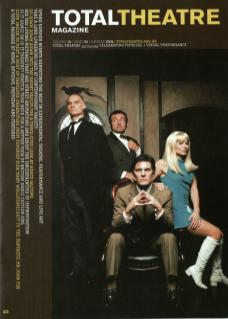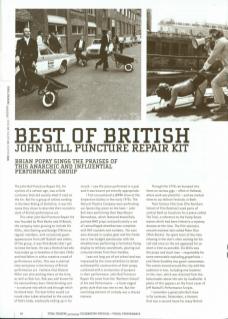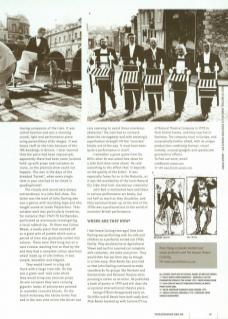The John Bull Puncture Repair Kit, for cyclists of a certain age, was a little container that did exactly what it said on the tin. But for a group of artists working in the West Riding of Yorkshire, it was the name they chose to describe their eccentric style of British performance art.
This other John Bull Puncture Repair Kit was founded by Mick Banks and Al Beach, the company later growing to include Diz Willis, John Darling and George O'Brien as regular members, with occasional guest appearances from Jeff Nuttall and others. Of the group, it was Mick Banks that I got to know the best. He was a Kentish lad who had ended up in Yorkshire in the late 1960s and had fallen in with a creative crowd of performance artists. This was a seminal time and place in the history of British performance art. I believe that Roland Miller was also working there at the time, as well as Rob Con. Rob was well known for his extraordinary beer-filled drinking suit – a costume into which and through which he drank beer. The best bitter would run round clear tubes attached to the outside of Rob's body, eventually ending up in his mouth. I saw the piece performed in a pub and it was bizarre yet entirely appropriate.
I first encountered a JBPRK show at the Serpentine Gallery in the early 1970s. The Natural Theatre Company were performing our Sports Day piece on the lawn – John Bull were performing their Beachboys / Barrowboys, which featured beautifully painted WW2 props and particularly a set of camouflaged wheelbarrows complete with RAF roundels and numbers. The cast were dressed in surplus gear and the finale was a low-budget spectacular with the wheelbarrows performing a formation flying display to military soundtrack, pouring out coloured smoke from their handles.
I was not long out of art school and was impressed by the close attention to detail and beautiful construction of their props, combined with a seriousness of purpose in their performance. John Bull Puncture Repair Kit came from the 'Northern School of Art and Performance’ – a hard-edged gritty style that was new to me. But the overriding element of comedy was a shared interest.
Through the 1970s we bumped into them on various gigs – often in Holland, where work was plentiful – and we invited them to our Walcot Festivals in Bath.
Their famous Film Crew (The Northern School of Film Realists) used parts of central Bath as locations for a piece called The Trial, a reference to the Pump Room waters which had been linked to a mystery disease at the time. The film starred a smooth matinee idol called Peter Slim (Mick Banks). He spent most of the time relaxing in the star's chair waiting for his call and once on the set appeared for as short a time as possible. Diz Willis was the props and stunt man – responsible for some memorable exploding grapefruits – and Steve Gumbley was guest cameraman. The scenes moved around the city with the audience in tow, including one location on the river, which was directed from the balustrades above the weir by loudhailer. A photo of this appears on the front cover of Jeff Nuttall's Performance Scripts.
I remember a great John Bull show in De Lantaren, Rotterdam, a theatre that was a second home for many British touring companies of the time. It was called Gunman and was a stunning sound, light and performance piece using paramilitary slide images. It was heavy stuff at the time because of the IRA bombings in Britain. I later learned that the piece had been improvised; apparently there had been some Customs hold-up with props and costumes en route, so the planned show could not happen. This was in the days of the dreaded 'Carnet', when every single item in your van had to be listed in quadruplicate!
The visuals and sound were always extraordinary in a John Bull show. The latter was the work of John Darling who was a genius with recording tape and who taught sound at Leeds Polytechnic. Their outdoor work was particularly inventive, for instance their 1969/70 Earthprobes, performed as astronauts investigating a local rubbish tip. Or there was Colour Wheel, a lovely piece that started off as a giant pile of jumble which over a period of time was gradually sorted into colours. These were then hung out on a vast circular washing line so that by the end they had a complete colour spectrum wheel made up of old clothes, it was simple, beautiful and elegant.
They would travel in a big old truck with a large crew cab. On top was a giant roof-rack onto which they would strap any oversize props. On one occasion they were carrying gigantic lumps of polystyrene painted to resemble concrete blocks. On the Dutch motorway the blocks broke free and in the rear view mirror the driver saw cars swerving to avoid these enormous obstacles! The cast had to run back down the carriageway and with seemingly superhuman strength lift the 'concrete’ blocks out of the way. It must have been quite a performance in itself.
I remember a great quote from Diz Willis when he was asked how ideas for a John Bull show came about. He said something to the effect that it ‘depends on the quality of the bitter'. It was especially funny for us in the Naturals, as it was the availability of the local Natural Dry Cider that kick-started our creativity!
John Bull is mentioned here and there in various performance art books, but not half as much as they should be, and their eventual break-up at the end of the 1970s was a profound loss to the world of eccentric British performance.
Where Are They Now?
I last heard (a long time ago) that John Darling was performing with his wife and children as a perfectly turned out 1950s family. They would arrive at Agricultural Shows and such in a period car complete with costumes, old radio and picnic. They would then live out their day as though in a time warp. Mick Banks has also told us that John Darling continued to make soundtracks for groups like Hesitate and Demonstrate and Rational Theatre while pursuing a career as an actor. He published a book of poetry in 1999 and still does the occasional interventionist theatre piece.
George O'Brien disappeared early on. Diz Willis and Al Beach have both sadly died. Mick Banks teamed up with Corinne D'Cruz of Natural Theatre Company in 1978 to form British Events, and they now live in Germany. The company tours in Europe, and occasionally further afield, with its unique productions combining humour, visual comedy, unusual gadgets and spectacular pyrotechnic effects. To find out more, email info@british-events.com or see www.british-events.com
Brian Popay is founder member and senior performer with The Natural Theatre Company. See www.naturaltheatre.co.uk


